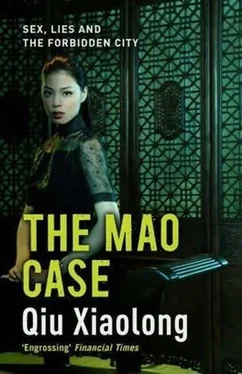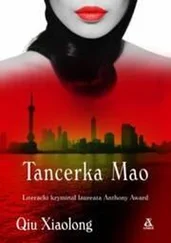There was an ancient convention, he remembered, about people putting the deceased’s clothes and hats into a coffin when the body was missing. He wondered if Jiao had done that for Qian, but it was out of the question that her clothes or hats would fit into such a small casket.
Was it possible that Jiao had hidden something else inside?
It was considered exceedingly unlucky and sacrilegious to disturb the dead by opening a coffin or a container with the ashes of a cremated person. But he succumbed to the temptation. Taking off the lid, he saw only a time-yellowed picture inside, of Shang wrapped in a white robe that revealed her snowy cleavage, standing barefoot by a French window.
He was shocked. It was imaginable for people to put a picture in a casket, but not such a picture of one’s grandmother. Looking up, as if under a spell, he stared at another picture, hanging above the headboard – that of Chairman Mao in his robe, waving his hands.
He shivered with the realization of the eerie correspondence between the two pictures.
Jiao must be so obsessed with Mao. But she should know better. Mao was responsible for Shang’s tragedy, and for Qian’s too, though not directly. A more justifiable reaction from Jiao would be hatred. Instead, it was a fixation on Mao, particularly on a fantasy of Shang’s sexual relationship with Mao.
But the discovery in her apartment hardly helped. If anything, it made Internal Security’s interest more justifiable. There must be something suspicious going on in secret with Jiao.
He glanced again at his watch. It was almost six thirty. Still more than an hour before her return. He decided to stay and check the bedroom closets. A large one and a small one. Peiqin had mentioned something about the closets on her list.
He pulled open the door of the larger closet and saw an impressive array of designer clothing. Some of the outfits were still wrapped in plastic. A receipt peeped out of one; it was dated about six months ago. The garment was a costly mandarin dress. Because of a recent case, Chen was able to recognize the dress as being in the style of the thirties or forties. Some other dresses in the closet, though slightly different in detail, were in the style of the same period.
Again, Chen didn’t remember seeing such a partiality in Jiao. At Xie Mansion she dressed casually. Jeans, blouse, overalls, T-shirts. Except for the last time he met her there, when she was wearing an apron over her pink and white mandarin dress.
He wondered whether these fancy clothes were in Shang’s style and whether Jiao, when at home, turned into a reflection of Shang. But then why should she have bought so many clothes without wearing them?
Possibly, somebody else bought them for her, whether she liked them or not.
He was startled by the blaring of his cell phone, echoing loudly in the closet. The number indicated it was Yong in Beijing. He turned it off, not knowing what to say at the moment. Nor could he afford the time.
He then shifted his attention to the smaller closet, which was used to store her painting supplies. Posted on the back of the door was a small note: “Leave things in the closet alone.” For the benefit of the maid, presumably. There were tubes of paint, brushes, canvas stretchers, palettes, easels, dippers, and other painting materials he couldn’t exactly name. Also there was a paint-smeared robe that had once been white. Several unfinished pieces were stacked against the wall. Apparently, when Jiao woke up at night, she would sometimes start painting in the bedroom. So the small closet served that purpose.
He had no idea how painters worked at home. As a poet, he occasionally woke at night, feeling excited about the possibilities of a fantastic poem, but usually he was too lazy to get up. So he fell asleep again, letting the nocturnal fantasies fade back into the darkness of night. Only on rare occasions did he try to scribble a few words on a scrap of paper he happened to find nearby. He was hardly able to make out the meaning in the morning.
Inspiration might come to Jiao at night, and being more diligent, she may have attempted to capture the fleeting idea there and then. Painting was different from writing. She had to get out of bed, spread out her material, work for hours, and then clean up. It was “unusual,” as Peiqin had put it, but it wasn’t his business. An eccentric artist, Jiao could live and work the way she pleased.
He was beginning to have second thoughts about his decision to come here, while remaining and rummaging in the closet.
Then his glance fell on a scroll box, which seemed to have been carelessly thrown in there. It caught his attention because he had never seen Jiao scroll-painting in the traditional Chinese style. She studied oil painting and water colors with Xie. He opened the box and pulled out a piece of paper on top. It turned out to be a valuation certificate that declared the scroll to be authentic – and worth a staggering price of more than two million yuan. The valuation was performed three days ago. How could she have left such a valuable possession in the closet like that after the recent burglary? He pulled out the scroll, which was one of Mao’s poems done in his brush calligraphy: “Ode to the Plum Blossom.” There was also a dedication on the upper right corner: “For Phoenix, in response to hers.”
Chen supposed it was possible Jiao had purchased the scroll because of its association with Shang – to be more exact, because of its association with Shang’s affair with Mao: Shang was nicknamed “Phoenix.” Alternatively, Jiao might have inherited the scroll, but he wasn’t sure how.
Could that be the very Mao material the Beijing government was so concerned about?
The dedication on a scroll didn’t necessarily mean anything, however. It was conventional for a calligrapher to copy out his work and add a line of a dedication for someone. As it was, the scroll might lead to unbridled speculation, but not to such a disaster as to throw the Beijing government into a panic. After all, someone’s nickname was not a conclusive piece of evidence.
Placing the box back into the corner, he saw a broom lying beside it. The broom had a coir head, soft, suitable for the hardwood floor. After Jiao finished painting, she probably had to clean up the mess with the broom.
As he closed the closet door, his mind was in a turmoil. But it was about the time for him to leave. He headed for the front door. On the way, the sight of the surrealistic painting in the living room reminded him of another possibility. She could have used the broom for the painting -
His train of thought was interrupted by the sound of footsteps in the corridor outside, which came to a stop in front of the door. He froze at the sound of a key ring clinking.
AND AT THE SOUND of a key in the lock, he backed up several steps.
When the front door started creaking open, he retreated in haste into the smaller closet, pulling the door closed behind him.
He heard footsteps in the living room, and then the bedroom. The situation was desperate. The first thing a young girl like Jiao would probably do now that she was back home was change her clothes. That meant a visit to the big closet. And as an industrious art student, she would then start to work. That meant the small closet.
Behind the closet door, Chen couldn’t see into the room, but he seemed to catch a whiff of perfume wafting near. He listened, holding his breath. She was stepping toward the large closet, as he had anticipated.
He prayed that after taking off her clothes, she would go to the shower. If so, he might be able to sneak out.
But then there came another sound, indistinctly, from the living room area -
“Jiao, I’m back.”
Читать дальше












